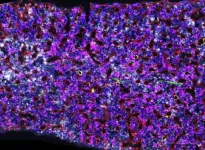(Press-News.org) Washington, D.C.—Microplastics are not just pollutants, but also highly complex materials that facilitate antimicrobial resistance, even without antibiotics, according to a new study. The findings were published in Applied and Environmental Microbiology, a journal of the American Society for Microbiology.
“Addressing plastic pollution isn’t just an environmental issue—it’s a critical public health priority in the fight against drug-resistant infections,” said lead study author Neila Gross, a Ph.D. candidate in the lab of Professor Muhammad Zaman at Boston University.
As global plastic use has surged, microplastic contamination has become widespread, with wastewater emerging as a major reservoir. At the same time, antimicrobial resistance (AMR) is rising globally, with environmental factors playing a key role. Microplastics are well known to harbor bacterial communities on their surfaces—the “plastisphere.”
In the new study, researchers sought to quantify AMR at clinically relevant levels and explore how microplastic characteristics influence AMR development. The researchers used different plastic types (polystyrene, such as the packing peanuts used for shipping; polyethylene, found in plastic zip-top bags; and polypropylene, which is found in crates, bottles and jars) and sizes (from half a millimeter to 10 micrometers—similar scale to a typical bacterium) and incubated them with Escherichia coli for 10 days. Every 2 days, the researchers checked the minimum inhibitory concentrations (MICs), or how much antibiotic is required to kill an infection, for 4 widely used antibiotics to determine if the bacteria were growing in resistance or not.
The researchers found that microplastics, regardless of the tested size and concentration, facilitated multidrug resistance in 4 tested antibiotics (ampicillin, ciprofloxacin, doxycycline and streptomycin) in E. coli within 5-10 days of exposure.
The researchers demonstrated that microplastics alone can facilitate increased AMR development. “This means that microplastics substantially increase the risk of antibiotics becoming ineffective for a variety of high impact infections,” Gross said. Prior research primarily focused on antibiotic-driven resistance, without considering the role of environmental pollutants like microplastics. Studies with microplastics looked mostly at resistance factors such as antibiotic-resistant genes (ARGs) and biofilms, not the rate or magnitude of AMR via their minimum inhibitory concentration to different antibiotics.
The researchers found that resistance induced by microplastics and antibiotics was often significant, measurable and stable, even after antibiotics and microplastics were removed from the bacteria. Ultimately, this means that microplastic exposure may select for genotypic or phenotypic traits that maintain antimicrobial resistance, independent of antibiotic pressure.
“Our findings reveal that microplastics actively drive antimicrobial resistance development in E. coli, even in the absence of antibiotics, with resistance persisting beyond antibiotic and microplastic exposure,” Gross said. “This challenges the notion that microplastics are merely passive carriers of resistant bacteria and highlights their role as active hotspots for antimicrobial resistance evolution.” Given that polystyrene microplastics facilitated the highest levels of resistance, and that biofilm formation—known to enhance bacterial survival and drug resistance—was a key mechanism, the results underscore the urgent need to address microplastics pollution in antimicrobial resistance mitigation efforts.
###
The American Society for Microbiology is one of the largest professional societies dedicated to the life sciences and is composed of over 37,000 scientists and health practitioners. ASM's mission is to promote and advance the microbial sciences.
ASM advances the microbial sciences through conferences, publications, certifications, educational opportunities and advocacy efforts. It enhances laboratory capacity around the globe through training and resources. It provides a network for scientists in academia, industry and clinical settings. Additionally, ASM promotes a deeper understanding of the microbial sciences to all audiences.
END
Microplastics increase antimicrobial resistance
2025-03-11
ELSE PRESS RELEASES FROM THIS DATE:
Endocrine Society elects Santoro as 2026-2027 President
2025-03-11
WASHINGTON—Endocrine Society members elected Nanette Santoro, M.D., of the University of Colorado School of Medicine in Aurora, Colo., as its 2026-2027 President. She will serve as President-Elect for a year beginning in July 2025 before becoming President in June 2026.
Santoro has served as E. Stewart Taylor Chair of Obstetrics & Gynecology at the University of Colorado School of Medicine since 2010. She is a well-recognized practitioner, dedicated mentor and leading researcher on studies of women with premature and age-appropriate menopause.
She has held many roles with the Endocrine Society, including serving as Vice President of Clinical Science, an author ...
Study explores effects of climatic changes on Christmas Island’s iconic red crabs
2025-03-11
The annual migration of Christmas Island’s red crabs – where millions of creatures cover its beaches as they make their way from land to sea – is a true natural spectacle.
However, little is known about whether and how the species might be impacted under the future environmental conditions created by the changing global climate.
A new study by scientists and graduates at the University of Plymouth has investigated one aspect of how such shifts might affect its earliest development.
Specifically, the research focused on whether lower ...
AI in engineering
2025-03-11
A review explores the role of AI in engineering, assessing the benefits and challenges of the synergy between the two fields. A 2004 DARPA contest pitted AI vehicles against one another in a race on 150 miles of dirt roads. The best-performing vehicle made it less than eight miles of the way. The next year, five vehicles finished a 132-mile course, and today driverless cabs are active in several major cities. Enthusiasts have suggested AI could improve transportation and manufacturing, medicine, consumer goods, and military technology. Rama Chellappa, Guru Madhavan, Ed ...
Dr. Megan Abbott and the University of Colorado awarded $450,000 establishing a Clinical Research Center of Excellence that will also serve as a second site for SYNGAP1 ProMMiS
2025-03-11
Mill Valley, CA – March 11, 2025 – The SynGAP Research Fund (SRF) dba Cure SYNGAP1, a 501(c)(3) nonprofit organization, has awarded a $450,000 grant to Dr. Megan Abbott and the University of Colorado to establish a Clinical Research Center of Excellence for SYNGAP1-Related Disorders at Children’s Hospital Colorado (CHCO).
This initiative expands the already established Natural History Study to the SYNGAP1 Prospective Multidisciplinary Multisite Study (ProMMiS) while providing specialized care for individuals affected by SYNGAP1-related disorders ...
Empire Discovery Institute appoints Dr. Ronald Newbold as Chief Executive Officer
2025-03-11
Rochester, NY – March 10, 2025 – Empire Discovery Institute (EDI), a leading non-profit drug discovery and development accelerator, is pleased to announce the appointment of Dr. Ronald Newbold as Chief Executive Officer (CEO).
Dr. Newbold, who joined EDI in 2021 as Chief Business Officer, has served as interim CEO since August 2022 and has been instrumental in driving the organization’s growth and success. Under his leadership, EDI has achieved significant milestones, including the growth of the Medicines Discovery ...
Douglas Hanahan, Ph.D., FAACR, honored with the 2025 Pezcoller Foundation-AACR International Award for Extraordinary Achievement in Cancer Research
2025-03-11
CHICAGO – The Pezcoller Foundation-American Association for Cancer Research (AACR) International Award for Extraordinary Achievement in Cancer Research will be presented to Douglas Hanahan, PhD, Fellow of the AACR Academy, during the AACR Annual Meeting 2025, to be held April 25-30 at the McCormick Place Convention Center in Chicago, Illinois.
Hanahan is the Ludwig Distinguished Scholar at the Lausanne Branch of the Ludwig Institute for Cancer Research. He is being recognized for his fundamental discoveries in cancer research that have had a far-reaching translational impact. Through the generation and characterization of innovative mouse models, Hanahan defined multistep ...
Mapping DNA's hidden switches: A methylation atlas
2025-03-11
Researchers have developed a comprehensive atlas that maps DNA methylation—a critical chemical modification governing gene activity—across 39 human cell types, revealing a complex landscape of epigenetic regulation. The study identified over 34,000 genomic regions exhibiting distinct ON/OFF methylation patterns at the two copies of the genome we inherited from our parents, a phenomenon known as allele-specific methylation. Some of these methylation changes are caused by genetic differences in genomic sequence of DNA, while others are due to parental imprinting—a ...
Beneficial genetic changes observed in regular blood donors
2025-03-11
Researchers at the Francis Crick Institute have identified genetic changes in blood stem cells from frequent blood donors that support the production of new, non-cancerous cells.
Understanding the differences in the mutations that accumulate in our blood stem cells as we age is important to understand how and why blood cancers develop and hopefully how to intervene before the onset of clinical symptoms.
As we age, stem cells in the bone marrow naturally accumulate mutations and with this, we see the emergence of clones, which are groups of blood cells ...
New research reveals psychological ‘booster shots’ can strengthen resistance to misinformation over time
2025-03-11
A new study has found that targeted psychological interventions can significantly enhance long-term resistance to misinformation. Dubbed “psychological booster shots,” these interventions improve memory retention and help individuals recognize and resist misleading information more effectively over time.
The study, published in Nature Communications, explores how different approaches, including text-based messages, videos, and online games, can inoculate people against misinformation. The researchers from the Universities of Oxford, Cambridge, Bristol, Potsdam and King’s College London conducted five large-scale experiments with over ...
Arctic sea ice loss drives drier weather over California and wetter over Spain and Portugal
2025-03-11
A study led by researchers from the Barcelona Institute for Global Health (ISGlobal), a centre supported by the "la Caixa" Foundation, has used a novel approach to unravel the influence of the loss of Arctic sea ice on the planet's climate, isolating it from other factors related to climate change.
The study, published in the journal Communications Earth and Environment, shows that on decadal timescales, the loss of Arctic ice favours the climate of the south-west of the United States - and California in particular - becoming drier on average, especially in winter. This phenomenon would also affect ...


